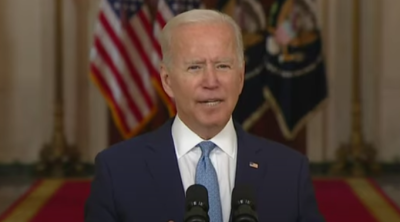Biden wants us to forget about Afghanistan. We must not

Even as the front pages of newspapers have noticeably shifted away from focusing on Afghanistan, reports trickling in from that country are increasingly troubling.
Recent reports tell us: Taliban fighters have hunted down and killed four elite Afghan counterterrorism agents from American and British-trained units. The Taliban’s new acting government is comprised of many of the same characters the United States and our allies kicked out of power in 2001. The United Nations has warned that one million Afghan children face possible starvation in a humanitarian disaster of epic proportions.
The effects of President Biden’s decision to withdraw U.S. forces from Afghanistan are still unfolding. Biden would no doubt love for his role in the Afghanistan debacle to fade quietly into history. We cannot let that happen.
Afghan women are perhaps the largest group of people to endure immense suffering in the fallout of the clumsy withdrawal and the subsequent Taliban takeover.
Countless women and girls in Afghanistan are facing an impossible future, with reports surfacing that women must be segregated in universities, women may no longer work alongside men, and women may be prevented from playing sports. These are disastrous steps backward for women’s rights in a country that made a lot of progress in the past 20 years. And it’s happening under Biden’s watch.
The Left has long styled themselves as the champions of women’s rights. So, what does the Biden administration have to say about the rights of Afghan women?
When asked about the future of women’s rights in Afghanistan during a Senate hearing this week, Secretary of State Antony Blinken said that ever since the Taliban takeover, the U.S. government has “worked to rally the international community to set very clear expectations going forward to include the expectation that it will uphold the rights of women and girls as well as minorities.”
It’s unlikely that these lackluster diplomatic efforts will comfort the millions of women in Afghanistan who have just been sent back to the dark ages.
Presumably, the “minorities” Blinken referred to include religious minorities, such as Christians, Hazara Muslims, Hindus, and Sikhs. Those who have not managed to flee are in great danger.
Eric Patterson wrote in Providence that “Christians and other religious minorities are fearful of venturing out in public, despite their needs for groceries, medical assistance, and other basic necessities.” Patterson also heard reports that Taliban spies collected the names of possible Christians by infiltrating crowds of people outside the Kabul airport hoping to escape.
Instead of working to help vulnerable Christians, the Biden administration made it more difficult for believers to flee. Private charities are still trying to help rescue vulnerable religious minorities and other at-risk Afghans with their own flights out of Afghanistan. Those involved in private rescue efforts say that the State Department has hindered efforts to rescue vulnerable Afghans.
It’s a life-and-death situation for those on the ground; what justification could there possibly be for blocking private flights not even headed to the United States?
In addition, the State Department also neglected to make religious minorities eligible for the Priority 2 (P-2) designation granting them access to the U.S. Refugee Admissions Program. Conversion from Islam is a crime punishable by death under the Taliban’s interpretation of Sharia law, and Christian converts face almost certain death for their religious views. Even though there were only a small number of Afghan Christians to begin with (several thousand), they were not prioritized by the Biden administration.
Biden’s disastrous withdrawal will also forever affect the families of the 13 U.S. military members who died in a suicide attack from ISIS-K at the Kabul airport in the chaotic last days of the evacuation. The grief of their families will not soon subside. Although they volunteered to serve our country knowing the risks, poor strategic decisions unnecessarily put them in harm’s way.
Some commentators have noticed that the newsiness of the Afghanistan withdrawal is “over.” But not so for those whose lives have been forever changed. In his public comments, Biden seems to coldly evade that fact.
Biden’s disaster in Afghanistan is not over by a long shot. The suffering of millions of people will far outlast the news cycle. And so should our collective memory.
Originally published at the Family Research Council.
Arielle Del Turco is Assistant Director of the Center for Religious Liberty at Family Research Council.





















